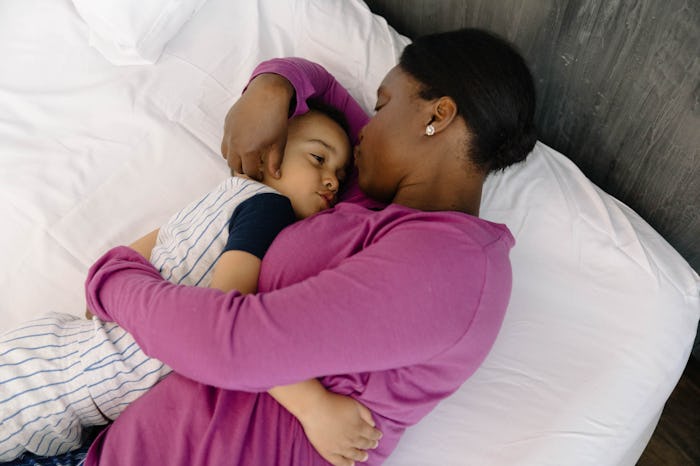For most parents, the newborn and infant stages are perhaps the hardest to navigate when it comes to sleep. But, as you probably know, just because your little one has graduated to toddlerhood does not mean that they will suddenly start sleeping through the night. Now that your child has a more developed sense of self and ability to communicate, bedtime can be quite the battle. That's why it might be helpful to know what the best sleep schedule for toddlers is, according to experts.
It's helpful to keep in mind that every child has unique needs, and it's OK if there's not a one-size-fits-all solution. There are, however, a few things experts — from pediatricians to psychologists — agree are ideal to include in your tyke's rest routine. In a phone interview with Romper, pediatric psychologist Dr. Elena Mikalsen says, "2-year-olds have to sleep a little bit more and the recommendation is about 12 to 13 hours, 3 to 5-year-olds can sleep a bit less and the recommendation is about 10 to 13 hours." Mikalsen also tells Romper that these time frames are a sum of the child's total sleep, including naps and overnight.
Though there seems to be an agreed upon guideline for how much sleep a toddler needs, there seems to be some wiggle room when it comes to the specifics. As psychoneurologist Dr. Becky Blake tells Romper, "I believe toddlers' schedules should reflect their household schedule." Depending on whether your job takes you out of the house or not, what would a sample schedule look like? Blake says:
"If a parent works, the child gets up with them to go to childcare, naps two hours around noon, quiet time around 3:00 p.m., bedtime around 8:00 p.m. For a stay-at-home parent, a child will naturally wake up — this could be 6:00 a.m. or 9:00 a.m — nap around noon or 1:00 p.m., rest around 3:00 p.m., and bed between 7:00 p.m. and 9:00 p.m. depending on what time they woke up."
Sticking with things is a common theme in healthy sleep habits for children. To reiterate the importance of keeping a consistent routine, Tracie Kesatie, a certified pediatric sleep consultant, tells Romper, "when toddlers do not have a sleep schedule, they are more likely to sleep less or go to sleep overtired, which leads to a poorer nap and night's sleep." Kesatie also agrees with Mikalsen and Blake that children between 2 and 5 years of age typically need one nap in the day and about 11 or 12 hours of sleep overall. Having a general guideline is certainly better than having nothing at all.
If you're curious as to why so many experts advise parents to aim for the early afternoon for nap time, there's actually a scientific reason behind it. As sleep expert Nicole Cannon tells Romper, "the best timing is to have them nap between noon and 1:00 p.m. due to a natural dip in their circadian rhythm — much like adults have around 4:00 p.m. — on a one nap a day schedule." So just like adults need to have a good night's sleep in order to fully function, your toddler benefits from having a consistent sleep schedule in the same way.
